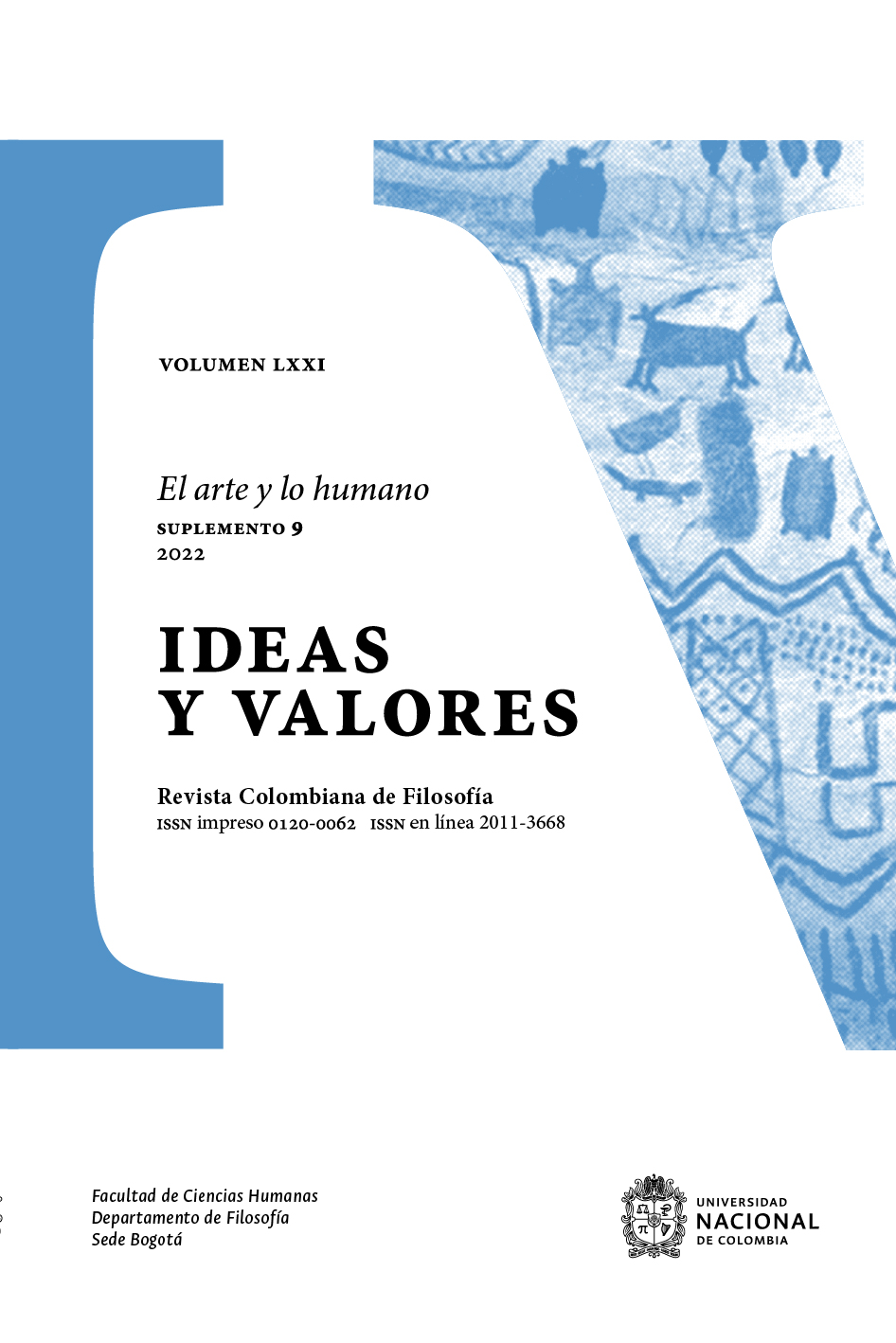Hacia una dimensión estética de la crítica. El tiempo de lo bello en las Cartas sobre la educación estética de Friedrich Schiller
Towards an Aesthetic Dimension of Critique The Time of the Beautiful in Friedrich Schiller's Letters on Aesthetic Education
DOI:
https://doi.org/10.15446/ideasyvalores.v71n9Supl.106745Palabras clave:
F. Schiller, belleza, crítica, dimensión estética, suspensión (es)F. Schiller, beauty, critique, aesthetic dimension, suspension (en)
Descargas
Se propone rastrear la interpretación que Schiller lleva a cabo en las Cartas sobre la educación estética del hombre del análisis kantiano del juicio de gusto puro como asociado con una suspensión de toda determinación que hace posible la experiencia de la belleza. Para Schiller, esto resulta en una temporalidad de lo bello experimentada como suspensión, que se torna adicionalmente en una suspensión de la temporalidad. El artículo muestra cómo este concepto resulta esencial para el concepto de crítica estética en Schiller, que se relaciona con una capacidad de la experiencia estética de desactivar formas de violencia que, según el diagnóstico que Schiller propone en las Cartas, saturan su presente histórico. Con ello, el artículo pretende mostrar la pertinencia de la obra de Schiller para la configuración de este aspecto de la crítica filosófica-histórica.
This article proposes to trace Schiller's interpretation in the Aesthetic Letters of Kant’s pure judgement of taste in connection to a suspension of all determination that makes the experience of beauty possible. For Schiller, this analysis conducts to a temporality of the beautiful experienced as suspension, which becomes itself a suspension of temporality as such. This paper shows the importance of this interpretation of temporality for Schiller’s conception of aesthetic critique, related to aesthetic experience’s capacity to deactivate forms of violence that, according to the diagnosis Schiller proposes in the Letters, saturate his historical present. Thus, this article shows the relevance of Schiller’s aesthetics for a philosophical historical conception of critique.
Referencias
Acosta López, María. La tragedia como conjuro: el problema de lo sublime en Friedrich Schiller. Universidad Nacional de Colombia, 2008.
Acosta López, María. “¿Una superación estética del deber? La crítica de Schiller a Kant.” Episteme N.S. 28.2 (2008): 3-24.
Acosta López, María. “Making Other People’s Feelings our Own: From the Aesthetic to the Political in Schiller’s Aesthetic Letters.” Who Is This Schiller Now? Edited by Jeffery High, Nicholas Martin and Norbert Oellers. Camden House, 2011. 187-203.
Acosta López, María. “The Resistance of Beauty: On Schiller’s Kallias Briefe in Response to Kant’s Aesthetics.” Epoche 21.1 (2016): 235-249. DOI: https://doi.org/10.5840/epoche20169173
Acosta López, María. “The Violence of Reason: Schiller and Hegel on the French Revolution.” Aesthetic Reason and Imaginative Freedom: Friedrich Schiller and Philosophy. Edited by María del Rosario Acosta López and Jeffrey Powell. State University of New York Press, 2018. 59-82.
Acosta López, María. “On the Poetical Nature of Philosophical Writing: A Controversy about Style between Schiller and Fichte.” Philosophers and their Poets: The Poetic Turn in German Philosophy Since Kant. Edited by Charles Barnbach and Theodore George. State University of New York Press, 2019. 21-45.
Acosta López, María. “Kallias or Concerning Beauty.” The Palgrave Handbook on the Philosophy of Friedrich Schiller. Edited by Antonino Falduto and Tim Mehigan. Palgrave, 2023. DOI: https://doi.org/10.1007/978-3-031-16798-0_9
Acosta López, María and Colin McQuillan (eds.). Critique in German Philosophy: From Kant to Critical Theory. suny, 2020.
Beiser, Fred. Schiller as Philosopher: A Re-Examination. Oxford University Press, 2005. Beiser, Fred. “Un lamento.” Friedrich Schiller: Estética y libertad. Editado por María del Rosario Acosta López. Universidad Nacional, 2008. 131-152.
Benjamin, Walter. El libro de los pasajes. Traducido por Luis Fernández Castañeda, Isidro Herrera y Fernando Guerrero. Akal, 2005.
Gasché, Rodolphe. The Idea of Form: Rethinking Kant’s Aesthetics. Stanford University Press, 2003. DOI: https://doi.org/10.1515/9780804780315
Henrich, D. “Beauty and Freedom: Schiller’s Struggle with Kant’s Aesthetics.” Essays in Kant’s Aesthetics. Edited by Ted Cohen and Paul Guyer. University of Chicago Press, 1982. 237-257.
Kant, Emmanuel. Kants gesammelte Schriften (Akademie Ausgabe). Georg Reimer, pos- teriormente Walter de Gruyter, 1900.
Kant, Emmanuel. Crítica de la facultad de juzgar. Traducido por Pablo Oyarzún. Monte Ávila, 1991.
Kerimov, Kh. “The Time of the Beautiful in Kant’s Critique of Judgment.” Epoche 24.1 (2019): 71-93. DOI: https://doi.org/10.5840/epoche20191011145
Kulenkampff, Jens. (ed.). Materialen zu Kants ‘Kritik der Urteilskraft’. Suhrkamp, 1974.
Cómo citar
MODERN-LANGUAGE-ASSOCIATION
ACM
ACS
APA
ABNT
Chicago
Harvard
IEEE
Turabian
Vancouver
Descargar cita
Licencia
Derechos de autor 2023 Los derechos son del autor(es), quien(es) puede re-publicar en parte o en su totalidad el documento ya publicado en la revista siempre y cuando se dé el debido reconocimiento a Ideas y Valores

Esta obra está bajo una licencia internacional Creative Commons Atribución-NoComercial-SinDerivadas 4.0.
De acuerdo con la Licencia Creative Commons Atribución-No Comercial-SinDerivar 4.0 Internacional. Se autoriza copiar, redistribuir el material en cualquier medio o formato, siempre y cuando se conceda el crédito a los autores de los textos y a Ideas y Valores como fuente de publicación original. No se permite el uso comercial de copia o distribución de contenidos, así como tampoco la adaptación, derivación o transformación alguna de estos sin la autorización previa de los autores y de la dirección de Ideas y Valores. Para mayor información sobre los términos de esta licencia puede consultar: http://creativecommons.org/licenses/by-nc-nd/4.0/legalcode.















.jpg)











